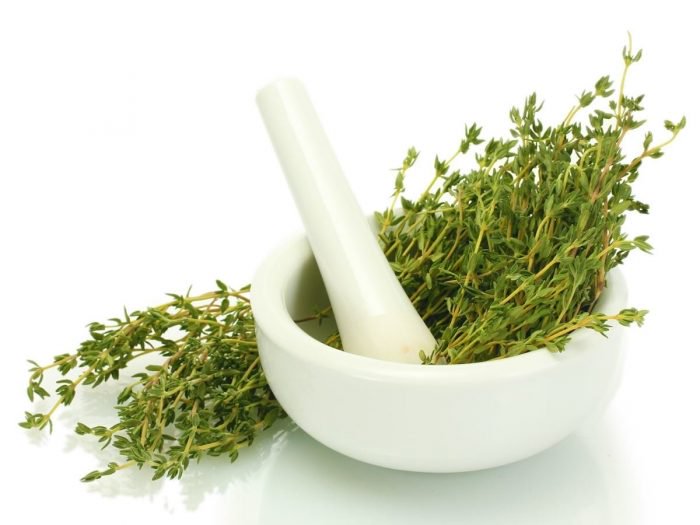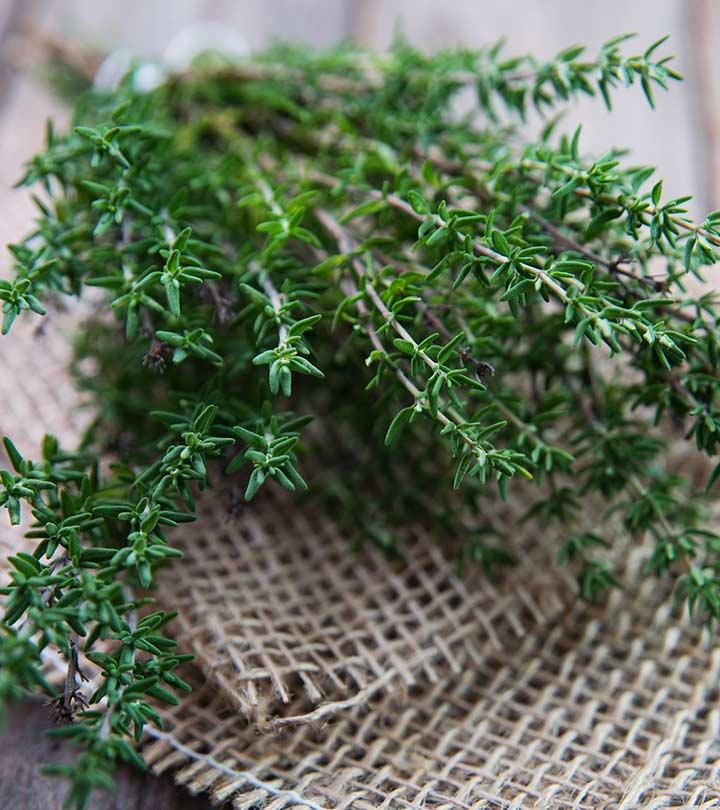Blog
What are the Ayurvedic properties of thyme?

Ayurvedic properties of thyme, this herb’s versatility extends beyond its primary uses. In Ayurveda, thyme is revered for its ability to pacify the Vata and Kapha doshas, primarily due to its warm, penetrating nature and drying qualities. This makes it particularly effective in counteracting the cold, damp characteristics often associated with Kapha imbalances, such as sluggish digestion, mucus accumulation, and respiratory congestion. Its efficacy in treating Vata-related disorders, such as nervousness, anxiety, and insomnia, can be attributed to its grounding and calming effects on the nervous system.
Thyme’s role in digestive health in Ayurveda cannot be overstated. Its bitter and pungent qualities stimulate the digestive fire (Agni), which is crucial in Ayurvedic philosophy for overall health and well-being. This stimulation aids in efficient digestion, absorption, and assimilation of nutrients, and helps in the detoxification process. Thyme is often recommended in Ayurveda for those with weak digestive systems or for those suffering from flatulence, indigestion, and irritable bowel syndrome (IBS).
In terms of mental health and cognitive function, thyme is valued in Ayurveda for its clarifying and rejuvenating effects on the mind. It is believed to enhance concentration, memory, and alertness, making it a useful herb for students and those engaged in mentally demanding activities. Its uplifting aroma is often used in aromatherapy to relieve mental fatigue and stress, embodying the Ayurvedic principle of healing through the senses.
Furthermore, thyme’s antiseptic and antibacterial properties are exploited in Ayurvedic medicine for oral health. Gargling with thyme-infused water is a traditional remedy for sore throats, gum diseases, and oral infections. The herb’s astringent properties tighten the gums, while its antimicrobial action helps in maintaining oral hygiene.
In skincare, thyme is utilized in various Ayurvedic formulations for its ability to cleanse and heal the skin. Its antifungal and antibacterial nature makes it effective against skin conditions like eczema, acne, and fungal infections. Thyme-infused oils and lotions are commonly used for their soothing and healing properties, especially in cases of insect bites, rashes, and minor cuts and wounds.
In the broader context of Ayurveda, thyme is not just considered a healing agent but also a preventive one. Regular incorporation of thyme in the diet is thought to fortify the immune system, enhance vitality, and promote longevity. This aligns with the Ayurvedic principle of “Swasthavritta” or maintaining health through a balanced diet, lifestyle, and use of medicinal herbs.
Thyme’s compatibility with other herbs and spices in Ayurveda is also noteworthy. It is often combined with other herbs to enhance its effectiveness and to tailor remedies to individual needs, highlighting the personalized approach of Ayurvedic treatment. For example, thyme may be combined with warming spices like ginger to enhance its respiratory benefits, or with cooling herbs like mint to balance its hot nature.
Thyme’s multifaceted role in Ayurveda underscores the holistic approach of this ancient science to health and wellness. It exemplifies the Ayurvedic belief in the healing power of nature and the importance of harmony between the body, mind, and environment. As Ayurveda continues to gain global recognition, the understanding and appreciation of thyme’s therapeutic potential are likely to grow, reaffirming its timeless value in natural health and wellness.
In Ayurveda, thyme’s warming and drying qualities make it particularly effective in managing conditions associated with excess moisture and coldness, typical of Kapha imbalances. For instance, in cases of sluggish metabolism, water retention, and excessive mucus production, thyme’s fiery nature helps to ‘dry out’ and ‘warm up’ the system, restoring balance. This aspect of thyme is also beneficial in treating Vata imbalances, such as bloating and gas, where its warming property helps to soothe the digestive tract and promote regularity.
The holistic perspective of Ayurveda also considers the emotional and spiritual aspects of health. Thyme, with its invigorating aroma, is used in Ayurvedic aromatherapy to uplift the mood, clear the mind, and reduce the symptoms of stress and anxiety. This is particularly relevant in managing Vata-dominated conditions, where mental agitation and nervousness are prevalent. The calming effect of thyme on the mind is a prime example of how Ayurveda uses herbs not just to treat physical ailments but also to promote mental and emotional well-being.
Moreover, thyme’s role in women’s health is highlighted in Ayurveda. It is often recommended for menstrual issues, such as cramps and irregular cycles, where its antispasmodic properties help alleviate pain and its regulatory action on the hormones helps balance menstrual cycles. Additionally, its warming nature makes it a valuable herb for women experiencing coldness in the reproductive system, a condition often associated with fertility issues in Ayurvedic medicine.
In Ayurvedic dietary practices, thyme is not only used for its flavor but also for its health-promoting properties. It is often added to foods to aid in digestion and to prevent the formation of toxins (Ama) in the body, which are believed in Ayurveda to be the root cause of many diseases. Thyme’s inclusion in meals is thus seen as a way to enhance not just the taste but also the nutritive value of the food, making it easier to digest and more beneficial for overall health.
Additionally, thyme’s role in immune support is increasingly relevant in the modern context. Its potent antimicrobial properties are believed to offer protection against a range of pathogens, making it a valuable ally during seasonal changes and in times of increased susceptibility to infections. This preventative aspect of thyme is in line with the Ayurvedic principle of building and maintaining a strong immune system (Ojas) to resist diseases.
In terms of safety and contraindications, Ayurveda emphasizes the importance of moderation and understanding individual constitution (Prakriti) before using any herb, including thyme. While thyme is generally safe for most people, it may not be suitable for those with Pitta dominance or those experiencing Pitta-related conditions such as acidity or heartburn, due to its warming nature. As with any medicinal herb, Ayurveda advises consulting with a knowledgeable practitioner to ensure safe and effective use.
In summary, thyme’s multifunctionality in Ayurveda extends from its physical health benefits to its mental and emotional healing properties. Its ability to balance the doshas, enhance digestion, support the immune system, and promote mental clarity and emotional stability epitomizes the comprehensive, holistic approach of Ayurveda to health and wellness. Thyme’s enduring relevance in Ayurvedic medicine is a testament to its potent healing properties and the wisdom of this ancient health system in utilizing the natural world for healing and prevention.
FAQ:
- What is Thyme in Ayurveda?
- Thyme, known as ‘Ajwain ke Phool’ in Ayurveda, is a herb celebrated for its medicinal properties and is often used in Ayurvedic treatments for its health benefits.
- How does Thyme balance the doshas in Ayurveda?
- Thyme is known to balance Vata and Kapha doshas due to its warm, penetrating nature. It helps counteract the cold and damp characteristics of Kapha and soothes Vata-related disorders.
- Can Thyme help with digestive issues according to Ayurveda?
- Yes, thyme’s carminative properties make it effective in treating digestive issues such as gas, bloating, and indigestion by stimulating the digestive fire (Agni).
- Is Thyme beneficial for respiratory health in Ayurvedic practice?
- Absolutely, thyme is used in Ayurveda for its expectorant properties, helping in treating respiratory infections, coughs, and aiding in expelling phlegm.
- Does Thyme have a role in mental and cognitive health in Ayurveda?
- Thyme is believed to enhance concentration, memory, and alertness in Ayurveda, and its aroma is used in aromatherapy to relieve mental fatigue and stress.
- Can Thyme be used for skin care in Ayurvedic treatments?
- Yes, thyme’s antiseptic and anti-inflammatory properties make it beneficial for treating various skin conditions, including acne and fungal infections.
- Is Thyme effective in women’s health issues as per Ayurveda?
- Thyme is often recommended in Ayurveda for menstrual issues due to its antispasmodic properties, and it helps in balancing menstrual cycles.
- How is Thyme used in Ayurvedic dietary practices?
- In Ayurvedic cuisine, thyme is added to foods to enhance digestion and prevent the formation of toxins (Ama), thereby improving overall health.
- Are there any side effects or contraindications of using Thyme in Ayurveda?
- While thyme is generally safe, it may not be suitable for those with Pitta dominance or conditions like acidity. It’s advised to consult an Ayurvedic practitioner for personalized advice.
- Can Thyme boost immunity according to Ayurvedic principles?
- Yes, thyme’s antimicrobial properties are believed to strengthen the immune system, making it a valuable herb for preventative health in Ayurveda.




